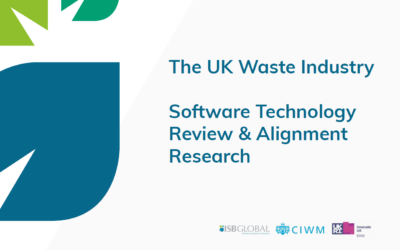The climate crisis has prompted businesses and organisations to consider their approach to sustainability. There are several factors driving this, including regulatory requirements, stakeholder demands and overall competitiveness.
We are, in fact, entering unprecedented times for businesses, where reporting and traceability, resilience and reliable systems are all important. Organisations need to be doing the right thing – and they need to be able to prove it when asked.
For many businesses, this means taking a detailed look at the way they approach business – from the processes in place to the systems they use. It is perfectly possible to run a profitable, sustainable business. And in most cases, embracing a sustainable approach results in business growth and an increased market share.
What are the risks?
If you are serious about leading a sustainable business, you need to understand the drivers and potential effects of the climate crisis on your business, take some decisions about how you will manage those issues, and make sure that your decisions are reflected in everything your business does.
As most savvy business leaders know, the climate crisis is not just about whether the summer is hot and the winter is wet. It’s about the impact that those changes have on countries that supply your business, and the new rules and regulations imposed on you to help manage some of the key issues. Impacts of the climate crisis on your business could include:
- Increased prices for scarcer natural resources
- Difficulties in securing a reliable supply chain
- Potential liabilities for individual business greenhouse gas emissions
- Inability to trade if unable to meet industry, state, country or international regulations
- Production difficulties related to water scarcity
- Problems with outsourced services in climate-affected countries
- Physical effects on buildings and people arising from extreme weather events
Businesses need to include all these risks – and any others specific to their operations – in risk planning and mitigation as a matter of urgency.
Stakeholder expectations
Responding to the climate crisis is now part of nearly every business-led conversation. Every stakeholder in your business expects you to be aware of the risks and to be taking steps to create a more sustainable business.
Investors recognise that a commitment to sustainability should be part of business planning, and that failing to plan could affect turnover and profitability in the years to come, reducing the value of the business and losing market share to competitors.
Regulators want to make sure you have the processes in place to meet requirements. They want to see that you have invested in systems, processes and reporting that demonstrates the differences your business is making.
Customers have their own regulations to meet and risks to manage and will be actively looking for suppliers who can help them to deliver a sustainable business, share their values and make a positive contribution to their activities.
Employees want to work for businesses that care about the environment. In a candidate-rich market, people are choosing to work for businesses that have made genuine commitments and are following them through. Organisations who fail to do this risk losing their people to more proactive competitors.
Communities are looking for commitment. Your brand reputation is important, so committing to and investing in a more sustainable approach will give you better local and industry PR.
Where do you start?
If you take the risks of climate change and combine them with your stakeholder expectations, you can see that you need to focus on putting sustainability at the heart of your business planning.
For waste management and recycling companies, there are several specific areas to manage. These include understanding and managing their greenhouse gas emissions, meeting Scope 1, 2 and 3 reporting, and taking the UN’s Sustainable Development Goals into account.
To do this, businesses need visibility: you can’t change what you don’t measure. Many business – particularly those that have grown through merger or acquisition – operate a large number of different processes and systems. These may be unsupported, have no one specifically trained to use them, be unfit for a growing function or not able to integrate with other systems.
This creates an instant inequality in your business. Some areas are able to function better than others, but nobody has an overview or performance, reporting, or compliance.
So the best place to start is looking at what data you need to track – including your own environment reporting data. And in order to make your business more efficient, more cost-effective and more streamlined, you need to look at your processes and organisation to see where you can work more sustainably in the future.
Collecting, tracking, analysing and reporting data requires an integrated software approach. This gives you immediate business intelligence, better insights and the flexibility to make changes to your business quickly and effectively. It also gives you the reporting ability to ensure you are meeting your sustainability goals, and to adjust your business practices to perform even more efficiently.
Working with ISB Global
ISB Global specialises in waste and recycling management software. Our single, integrated software platform, is designed to help your business meet its own goals, while also supporting your customers to meet theirs. It helps to simplify and modernise your processes, reduce unnecessary expense and give you the business insights you need in order to grow a sustainable, profitable business.






